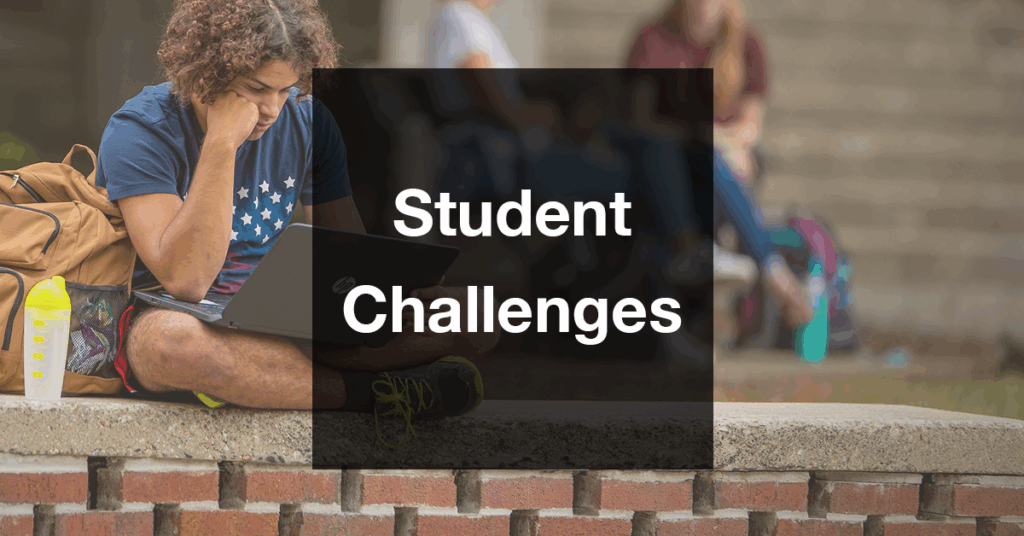Every fall and spring semester, the Division of Online and Strategic Learning administers the Student Satisfaction Survey to learners at Ball State. We use this data to understand the biggest challenges our students report. In the past few years, the top five challenges have remained consistent. This blog explores those five student challenges and how we might address them.
The Student Satisfaction Survey
Students access the survey via a University Comm Center email and our Canvas environment. Participation is voluntary and anonymous. Students are invited to share feedback about their experiences at Ball State University with advising, challenges to their learning, course satisfaction, modality preference, and more. All of this data is collected, and we share reports in a folder accessible to anyone with Ball State credentials.
Nearly 2,000 students respond to the survey every semester. The questions have become standard over time, giving insight into how the student experience at Ball State has changed, or remained static, over the past few years. This makes the examination of the challenges students face on and off campus particularly salient. Students rate difficulties in areas like health, finances, work, and family using these options:
- No Difficulties
- Minor Difficulties
- Moderate Difficulties
- Serious Difficulties
- Does Not Apply
They are also prompted to share comments on three of their challenges.
Recently, my colleagues have written about the results of the survey, including how these challenges intersect with each other in predictive ways, how these challenges support flexible teaching practices, and how to focus on exhaustion as a prevalent struggle for students. A pattern has emerged from our review each semester. The five most frequent challenges students report—Exhaustion/Fatigue, Mental Health, Motivation, Financial Hardship, and Affordability of Course Materials—have been the most prevalent the past several years we have administered the survey.

What Needs Are Learners Expressing?
These top student challenges are reported with consistent and significant frequency:
- Since inclusion in fall 2023, Exhaustion and Fatigue has consistently been the first or second biggest challenge, with an average of 77% of respondents reporting some kind of difficulty throughout the semesters.
- Mental Health has also been prominent, averaging 73% of respondents reporting difficulty.
- Motivation to Complete Schoolwork is usually in the top three with an average of 71% of students reporting struggles over the past few years.
- Financial Hardship and Affordability of Course Materials are similar challenges with each affecting an average of 55% of students.
In recent semesters, we have written about this data by looking at overall patterns from all challenges. To better understand these most persistent challenges, let’s examine how students describe them in their comments. Below are key themes for each.
Exhaustion or fatigue stems from balancing school, work, health, and personal life. Students describe juggling these parts of their life as overwhelming. Many cite academic workloads and the pace of the semester (especially spring) as draining.
Mental Health challenges arise from personal struggles, schoolwork, and relationships. A common theme is that heavy workloads worsen mental health, making it harder to keep up. Others mention isolation from reduced social time.
Motivation to Complete Schoolwork is framed as a reaction to feelings of burnout. Students want assignments to feel meaningful and relevant. “Busy work” and core curriculum courses are frequent frustrations.
Financial Hardship is a broad term which allows students to express challenges with the costs of various resources. Students struggle with costs like food, housing, transportation, and financial aid complexities. Limited grant/scholarship availability adds to stress.
Affordability of Course Materials is focused on frustration with the different ways materials are available. Students want cheaper options (e.g., digital) but note they aren’t always usable. Some feel materials aren’t worth their cost. Required paid software is another pain point.
Unpacking These Results
These student challenges–Exhaustion, Mental Health, Motivation, Financial Hardship, and Course Material Costs–consistently top the survey. Future blogs will explore each in detail, offering practical ways instructors can help.
In the meantime, have you faced—or tackled—these challenges as a student or instructor? How has that informed your teaching practices?



Comments:
Interesting data. I assume the survey is administered at the end of the semester. If that is so, I wonder how much the “end of semester experience” impacts the results. If the survey were administered during week six of the semester, for example, I wonder how the results might be different. Is it possible the reported results just reflect students’ attitudes during a very high-stress moment in time and may not be representative of the semester as a whole.
It would also be very interesting to disaggregate this data to see if there are significant differences in different populations of the respondents.
Thank you for your thoughts, Dave!
The survey is administered in the two weeks before course evaluations are sent out. This is to achieve a solid response rate and provide distinction with other campus-wide surveys the students are receiving. It’s also important to collect data in the second half of the semester so First Year students have more time to acclimate to campus.
In regard to comparing different groups in the data, we intend to do that in upcoming blog posts, so please stay tuned for that.